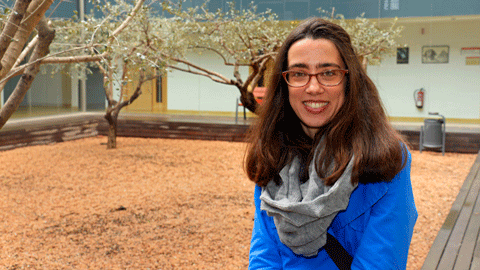"For revisionist theses, social movements are not historical actors"

26/03/2015
Luciana Soutelo, researcher of the Institute for Contemporary History of Lisbon and professor of the University of Porto, conducted a comparative study on the recollection of the Spanish Transition and Portuguese Revolution through the press of each of the countries. On 25 March, she offered a seminar entitled "Recollections from the Portuguese Revolution and the Spanish Transition through the Press: a comparative study (1986 to 1994-1996)" at the Faculty of Philosophy and Arts. The seminar was organised by the Franco Era Research Group (GREF-CEFID) and by the UAB Department of Modern and Early Modern History.
How is the Carnation Revolution documented in the press and media in Portugal?
My objective was precisely to try to understand society's versions of what had happened; find diversity in the points of view, newspapers with different approaches, and understand the recollections of different political cultures. Since the mid-1990s, there has been a struggle in the historical memory of the Portuguese between what I call antirevolutionary or revisionist recollections and anti-revisionist recollections. This happened mainly after the 20th anniversary of the revolution, when there were heated debates about it.
What happened at that time?
In 1994, people felt outraged by the appearance of revisionist discourses on both the dictatorship and the revolution. The main reason for this was that the critical voices protested against the "whitewashing" of Salazar and his regime. After that year, there was an irruption of anti-revisionist supporters, which already existed since the 1980s but were very underground: they were limited to newspapers with a small number of readers, such as the one belonging to the Portuguese Communist Party (Avante!) or the O diário, which also sympathised with the PCP.
Are there similarities between the evolution in the Portuguese and Spanish media of the treatment given in those years?
I studied the years 1986 to 1994 (in the case of Portugal, coinciding with the 20th anniversary of the revolution) and 1996 (in the case of Spain, coinciding with the beginning of the civil war). During that period, the reports on the will to reconcile and the existence of a model transition predominated in Spain, and they brought together different political cultures, from the central left to the right wing parties. In the mid-1990s, criticism towards the transition began to gain force, especially among the peripheral nationalists and the left wing parties.
In the text A memória do 25 de Avril nos anos do cavaquismo: o desenvolvimento do revisionismo histórico através da imprensa (1985-1995) (University of Porto), you explain that there is a parallel evolution of the boom in historic revisions and the predominance of neoliberalism.
Yes, they are directly related because historical revisionism can be defined as a set of ethical and political revaluations on several events of the 20th century, especially authoritarian and revolutionary experiences. They do not consider historical contexts and represent a right wing political culture.
Exclusively?
In Portugal, historical revisionism is very widespread and ranges from central left to extreme right wing parties. Many sectors of the moderate left defend revisionist theses on the revolutionary and decolonisation periods. They particularly condemn social movements and revolutionary radicalisation: for revisionist theses, social movements are not historical actors. Or they are not part of the story, or they are considered to be manipulated by the political and military forces.
What about Spain?
The case of Spain is slightly different. The appearance of historical revisionism in Spain as a social phenomenon takes place at the end of the 1990s and beginning of the 21st century. The revisionist theses belong practically exclusively to the right wing parties although when it comes to the II Republic and the Republican side of the Civil War, they are sometimes also defended by the central left. For example: in 1992, coinciding with 100 years since the birth of Franco, the newspaper El País published an editorial which focused on criticising the rehabilitation of Francoism, but also admitted that if the other side had won the civil war, it would have been no guarantee of having a liberal democracy. In this sense, a parallelism can be established between aspects of the Second Spanish Republic and the revolutionary period in Portugal as subjects which are more prone to revisionist interpretations.
What weighs heavier in the boom in revisionism in the press, the information provided or opinion articles?
I believe the articles. In the case of Spain this is clear. But in the period I studied for Spain, revisionism cannot yet be considered to be a social phenomenon. In the case of Portugal it is; although there are many reports, the articles are also large in number.
Do you think the growing interest in historical memory will help to have a less mediatic recall of the Portuguese Revolution and the Spanish Transition?
At the end of the 20th century, people were obsessed with the idea of historical memory and this reached its peak in Portugal in the mid-1990s and a bit later in Spain. But I am not sure this growing interest will necessarily favour our knowledge of history, because there is an excess of information which is not always historically valid.
More information:
Research Group on Dictatorships and Democracies